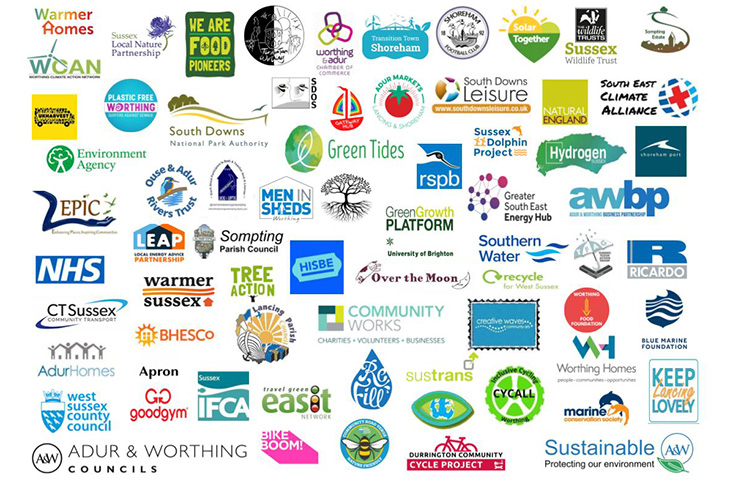Take climate action in Adur and Worthing
Working together on climate action

Adur & Worthing is a thriving hub of engaged businesses, proactive community groups and empowered residents. We are all committed to protecting the environment and creating an exciting, enjoyable place to live.
On this page you will find examples of projects happening in Adur and Worthing as well as some ideas of how you can get involved in your community:
Climate actions for businesses
If you are a business interested in becoming more sustainable, you could try the following:
- Switch to Ecosia: the tree planting search engine - Ecosia website
- Switch to renewable energy
- Educate and motivate your staff: The Carbon Literacy Project website
- Offer recycle bins: What you can recycle
- Coffee cup recycling for companies - Recorra website
- Sign up for commercial food waste collection
- Make it easier for employees to travel sustainably - easitNETWORK website
- Sign up for the Cycle to Work scheme - GOV.UK website
- Adjust heating and cooling system timings, temperatures and rooms (guide to energy saving) - Carbon Trust website
- Better business guide to energy saving | The Carbon Trust
- Minimise waste from products and packaging
- Switch to LED bulbs
- Install low-cost thermostatic radiator valves
- Visit West Sussex County Council's Lets Go! Net Zero website
Invest in
- Insulate your buildings
- Update your fleet with electric vehicles
- Decarbonise the way you heat your buildings: by moving away from traditional gas boilers to renewable heat options such as air source heat pumps
- Switch on-site cooking facilities: from gas to electric
- Install solar panels
- Improve facilities to encourage cycling and active travel: such as on-site showers, lockers and secure cycle storage
Useful resources and videos for businesses
Here are some resources you may find helpful to help you to become a sustainable business:
- Let's Go Net Zero website
- UK Business Climate Hub website
- Clean Growth Hub UK (South East Hub) website
- Energy efficiency for businesses (GOV.UK) website
- Sustainability basics programme - Small Business Britain website
Climate actions for community groups
We have a number of community groups in Adur and Worthing taking climate action and working on sustainable projects related to the circular economy, food waste minimisation, marine conservation, energy efficiency and nature recovery.

We regularly collaborate with community groups in Adur and Worthing on sustainability projects. If you are a community group taking climate action, please email:
Adur & Worthing Councils recently awarded local projects funding through the Community Infrastructure Levy. Local groups submitted bids to fund community projects, many included climate action work. The summary of successful bids can be found here:
Climate actions for residents
There are some simple and easy things that we can all do to reduce our carbon footprint, adapt to climate change and make a big difference to the natural world.
Start by measuring your carbon footprint using the:
In your home
- Make your home more energy efficient
- Switch to LED light bulbs: buying energy efficient products - on the Energy Saving Trust website
- Choose appliances with high-efficiency ratings: buying energy efficient products - on the Energy Saving Trust website
- Insulate your home: reducing home heat loss - on the Energy Saving Trust website
- Lower your thermostat: Set thermostats no higher than 19°C and the water temperature in heating systems no higher than 55°C: heating controls - on the Energy Saving Trust website
- Save water:
- Consider switching to a low-carbon heating system: in depth guide to heat pumps - on the Energy Saving Trust website
- Get more tips for improving the energy efficiency of your home - on the Energy Saving Trust website
- Find inspiration from the Eco Open Houses:
Back to more tips for residents or Back to top
In your garden
- Use only peat-free compost:
- Use less water and capture, reuse and recycle water: managing water in your garden - on the RHS website
- Grow your own fruit and vegetables - on the RHS website
- Create an eco-friendly front garden (and driveway) - on the RHS website
- Create a pollinator-friendly garden:
- Composting and food waste composting - on the Get Composting website
- If you don't have a garden:
Back to more tips for residents or Back to top
When travelling
- Walk, cycle or use public transport where possible.
- Aim to walk to places you can reach on foot within 15 minutes - and leave the car at home. It's a great way to incorporate steps into daily life. Check out tips on the Living Streets website
- Buy a second hand refurbished bike or get help to repair your old one:
- Hire a bike:
- Car share or join a Car Club:
- Try an electric vehicle: a Voice for Electric Vehicle Drivers in England - on the EVA England website
- Choose a car with low emissions if buying an electric car isn't an option.
- Low emission cars: guide to electric vehicles - on the Zap Map website
Back to more tips for residents or Back to top
What you eat
- Eat less meat and dairy products: planet based diets - on the WWF website
- Eat seasonally: seasonal UK grown produce - on the Vegetarian Society website
- Buy local:
- Grow your own: find out about community growing projects - on the Green Tides website
- Avoid products containing palm oil
- Reduce food waste:
- Food storage A to Z - on the Love Food Hate Waste website
- or download the 'Olio' or 'Too Good to Go' food saving apps from the Apple App Store or Google Play Store.
- Compost your food waste:
- Join one of the community composting schemes
Back to more tips for residents or Back to top
What you buy
- Buy less stuff
- Mend, upcycle or swap your clothes:
- Donate unwanted clothes to charity shops or textile banks: recycling Centres in Adur and Worthing
- Sell unwanted goods: Swish organised by Neighbourhood Store - on Facebook
- Buy second-hand furniture: we don't need to buy more stuff, the people who kit out their homes for free - on The Guardian website
- Upcycle your existing furniture: Men In Sheds (Lancing & Sompting) - on Facebook
- Buy reclaimed or pre-loved wooden furniture: timber scorecard - on the WWF website
- Fix rather than replace electrical appliances:
- Whatever you can't reuse - recycle!
- For harder-to-recycle items:
Every little change makes a difference, to the environment and the whole of Adur and Worthing. It can also be more cost-effective, efficient and enjoyable.
If you would like to share information about any projects happening in your community, please email:

Need assistance with this service?
Get in touch:
Sustainability
Problem with this page?
Page last updated: 27 June 2025

